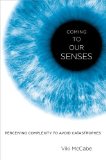January 30, 2014

Consciousness and the Brain: Deciphering How the Brain Codes Our Thoughts by Stanislas Dehaene (Viking, 2014)
(kindle ed.), (amazon.co.uk)
Book description from the publisher:
A breathtaking look at the new science that can track consciousness deep in the brain
How does our brain generate a conscious thought? And why does so much of our knowledge remain unconscious? Thanks to clever psychological and brain-imaging experiments, scientists are closer to cracking this mystery than ever before.
In this lively book, Stanislas Dehaene describes the pioneering work his lab and the labs of other cognitive neuroscientists worldwide have accomplished in defining, testing, and explaining the brain events behind a conscious state. We can now pin down the neurons that fire when a person reports becoming aware of a piece of information and understand the crucial role unconscious computations play in how we make decisions. The emerging theory enables a test of consciousness in animals, babies, and those with severe brain injuries.
A joyous exploration of the mind and its thrilling complexities, Consciousness and the Brain will excite anyone interested
in cutting-edge science and technology and the vast philosophical, personal, and ethical implications of finally quantifying
consciousness.
Google Books preview:
Comments (1)
- cognitive science,consciousness,new books

Coming to Our Senses: Perceiving Complexity to Avoid Catastrophes by Viki McCabe (Oxford University Press, USA, 2014)
(kindle ed.), (amazon.co.uk), (UK kindle ed)
Book description from the publisher:
In this fascinating book cognitive scientist Viki McCabe argues that the catastrophes we now face–economic recessions, ecological devastation, and political paralysis–originate in our ignoring the world we perceive and acting on the theories we conceive. Using cutting-edge research and compelling true stories– the Wall Street banking fiasco, the submerging of New Orleans, and the escalation of global temperatures– McCabe argues that these problems originate in our relying on the wrong source for our information: the archives within our heads with their opinions and biases, instead of our subliminal perceptions of what is happening on the ground.
McCabe shows that while our “mind’s eye” “sees” a world made of separate, nameable parts, the earth actually operates as a coalition of complex working systems (from cells to cities to economies). Such systems cannot be understood in words, but require fractal-like configurations that our perceptual systems have evolved to parse and that reflect each system’s structure, characteristics, and functions. Thus, we comprehend systems as disparate as neural networks, river deltas, and economies not from their verbal descriptions, but by perceiving their branching structure. We recognize others as they walk from the figure eight that oscillates around their belly buttons. Form not only follows function, it doubles as information.
McCabe also documents how using this information saved the USS Missouri, a kidnapped child, and victims of the Asian tsunami. Thus, she counsels us to put our mentally manufactured theories aside and focus on our perceptions so that we can reconnect to reality, make more informed decisions, block hostile mental takeovers, and come back to our senses.
Google Books preview:
Comments (0)
- cognitive science,culture,new books
January 28, 2014

It’s a Jungle in There: How Competition and Cooperation in the Brain Shape the Mind by David A. Rosenbaum (Oxford University Press, USA, 2014)
(kindle ed.), (amazon.co.uk), (UK kindle ed.)
Book description from the publisher:
The saying “It’s a jungle out there” refers to a competitive environment in which you’d better hone your skills if you hope to survive. And you’d better do what you can to keep a roof over your head, food in your belly, a leaf on your loins, and a mate who’ll help pass on your genes to the next generation of jungle Jims and Janes.
Distinguished professor and cognitive psychologist David Rosenbaum takes this metaphor of surviving in the wild and applies it to the competitive arena within the brain. He argues that the overarching theory of biology, Darwin’s theory, should be the overarching theory of cognitive psychology, the science of mental functioning. He explores this new and intriguing idea by showing how neural elements compete and cooperate in a kind of inner jungle, where only the fittest survive. Competition within your brain does as much to shape who you are as the physical and figurative competition you face externally.
Just as the jungle night seethes with noisy creatures beckoning their mates, issuing their warnings, and settling their arguments, you might have trouble falling asleep at night because the thoughts in your head are fighting for their chance at survival. Rosenbaum’s pursuit of this bold idea explains why we are shaped into who we are, for better or worse, because we are the hosts of inner battlefields.
Written in a light-hearted tone and with reference to hypothetical neural “creatures” making their way in a tough environment, Rosenbaum makes cognitive psychology and his theory easy to understand and exciting to ponder. Rather than rely on the series of disconnected phenomena and collection of curiosities that often constitute cognitive psychology, It’s a Jungle in There provides a fascinating way to place all cognitive phenomena under one flourishing tree.
See also: Author’s website
Comments (0)
- cognitive science,new books





